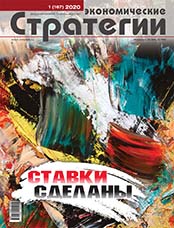Bets Made
DOI: 10.33917/es-1.167.2020.5
Opening address of editor-in-chief

DOI: 10.33917/es-1.167.2020.5
Opening address of editor-in-chief
DOI: 10.33917/es-1.167.2020.6-17
In the second part of the article, as an example of regional strategies of the Vladimir, Kostroma, Irkutsk regions of Russia, Trans-Baikal Territory and St. Petersburg, as well as regional strategies for the Kyzylorda and Akmola regions of Kazakhstan, the author examines the level of social development of the region and assesses its target orientation to improve the welfare of its population. It is concluded that the preservation of the health of the population, especially children and able-bodied citizens, is the highest goal in the field of improving welfare
DOI: 10.33917/es-1.167.2020.18-23
On February 22-24, 2019 in the village of Kulikovka, the Perm Territory, on the basis of JSC Perm Scientific Industrial Instrument-Making Company a strategic session aimed at formation of the “Photonics” cluster was held. As a basic concept for the session, the concept of a complete technology package was chosen. As the format of the event was used the format “Strategic Expert Community Ust-Kachka (UK)”, positioned by a number of experts as a new-generation thought factory. The expert pool included leading specialists of the PNPPK, providing operation of the territorial innovation and industrial cluster “Photonics”, representatives of the leading Russian scientific institutions in the field of photonics, representatives of federal authorities responsible for forming sectoral and cluster policies in the Russian Federation, corporate and banking community (VEB), as well as synthetic experts (CC system specialists).
The Belarusian nuclear power plant near the city of Ostrovets, Grodno region, is being built taking into account new standards dictated by both global changes in global security requirements and the development of technology. Vitaly Polyanin, vice president and project director for the construction of the Belarusian NPP of ASE IC JSC (Engineering Division of Rosatom State Corporation) spoke about the final stage of large-scale Russian-Belarusian construction in an interview with ES magazine.
DOI: 10.33917/es-1.167.2020.28-35
Global challenges as the core of the processes of globalization and formation of a new world order provide direction and rhythm of transformation processes in all countries. The article dwells on a set of interconnected global challenges, their retrospective dynamics and future trajectories. Particular attention is paid to the place of Russia in global transformations. It was revealed that thanks to measures taken at all levels of management, positive dynamics have formed in relation to many challenges, but the progress is developing at the expense of ecology and safety. Critical for Russia is a fundamental science cost lag; with such a gap, we won’t be able to ensure defence, economic and technological security and will form the future for ourselves on the far reaches of the world progress
DOI: 10.33917/es-1.167.2020.36-41
The traditional and most developed form of international economic relations is foreign trade. This article analyzes the dynamics and structure of Russia’s foreign trade with the EU countries in the period from 2011 to 2018. It should be emphasized that external challenges not of an economic but of a political nature have led to the disruption of economic cooperation between the Russian Federation and the EU, including in the field of trade, which underlines the relevance of this study. The purpose of this study is to identify the impact of sanctions and counter-sanctions on the dynamics and structure of mutual trade between Russia and the EU
DOI: 10.33917/es-1.167.2020.42-47
The article examines the nature of trade representatives abroad and their role in Russian exporters’ participation in value chains. To this end the author proposes a role model for functioning of the Russian trade missions, as well as analyzes operation of Russian trade representatives in some EU countries in the paradigm of value chains and proposes measures to increase trade missions’ efficiency in some EU countries. As part of the analysis, the author made use of analytical reports on the state of economy and the main directions of foreign economic activity, prepared by trade representatives, as well as analytical materials received from trade missions of the Russian Federation abroad
DOI: 10.33917/es-1.167.2020.48-52
The article analyzes the consequences of increase in FRS rates for developing economies. It is shown that even minor changes in this indicator significantly affect not only the direction of global financial flows, but also the growth prospects of developing countries. Therefore, it is necessary to take into account the influence of market expectations regarding direction of the US FED interest rate when formulating monetary policy, applying monetary control tools and developing proposals for macroeconomic decisions
DOI: 10.33917/es-1.167.2020.53-63
This article presents the theoretical foundations of state financial control and audit. The concept and essence of state financial control and audit are defined, the types and forms of financial control are revealed, and the legal regulation of strategic audit is considered
DOI: 10.33917/es-1.167.2020.64-71
In July 2019 the Federal Law of December 31, 2014 N 488-FZ “On industrial policy in the Russian Federation” that determines legal and regulatory basis of the usage of special investment contract instrument (SPIC) was extensively revised. At this moment a package of new secondary legislation is being developed, regulatory framework in the sphere of SPIC is due to be reviewed locally. The article analyses key changes and distinctions between ‘SPIC 2.0’ and the previously used variant of the instrument. In the article there are given the results of SPIC’s application in the previous version during 4-year period. Taking into account that the reviewed changes of the instrument not only clarifies its content and masters its application but also changes subject focus of SPIC one can be talking about complex reforming of the instrument at present time